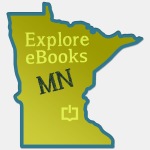 TO: Minnesota Libraries
TO: Minnesota Libraries
FROM: State Library Services
DATE: May 8, 2014
SUBJECT: Explore eBooks MN Webinar
Access to eBooks: Challenges Facing Libraries and Publishers
Wednesday, May 21, 2014, 1–2 p.m.
Providing cost-effective access to eBooks is a central concern of Minnesota’s libraries. The barriers to providing access to eContent collections varies by type of library, and is driven, at least in part, by a tension between the practices of publishers designed to increase sales and the desire of libraries to provide access to content of high interest and/or need to patrons. Additionally, companies use digital rights management (DRM) to restrict certain book formats to work with specific devices, forcing libraries to purchase a single title in multiple formats. This session will explore the challenges facing academic, public and K-12 libraries. Participants will emerge with a deeper understanding of the shared barriers to increasing cost-effective access to eContent and learn about the groundbreaking work of the ReadersFirst initiative.
Intended Audience: Open to all public, academic, K-12, and special librarians, and others interested in learning more about eBooks and libraries.
Presenter: Jamie LaRue, LaRue and Associates Consulting
After leading the Douglas County (Colorado) Libraries for over 23 years, Jamie LaRue struck out on his own to be a full time thought leader. He writes, speaks, and consults about the future of public libraries. He is the author of “The New Inquisition: Understanding and Managing Intellectual Freedom Challenges,” and is well known for the Douglas County Libraries Model, a library platform for the management of eBooks.
Register now. There is no fee to attend this webinar.
This project was made possible in part by the Institute of Museum and Library Services through the Grants to States program, administered by the Minnesota Department of Education, State Library Services.
For more information, contact Jennifer Verbrugge at 651-582-8356 or jennifer.verbrugge@state.mn.us.
This webinar is the second of five webinars leading up to the August Explore eBooks MN Summit event at St. Catherines University. Get all of the details about the webinars and the Summit at Explore eBooks MN today!




